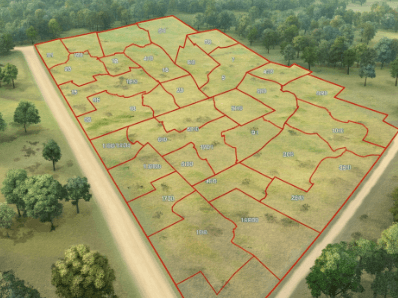Subdividing land can be a smart way to maximize the value of your property, but understanding the cost to subdivide land is crucial before moving forward. Land survey fees typically range from $500 to $5,000, while engineering designs can cost between $2,000 and $10,000, depending on the land’s size and complexity. Infrastructure improvements like adding utility lines or roads can quickly add $15,000 to $50,000 to the budget. While these costs may seem high, the potential to increase the land’s overall value makes it worthwhile. Steve Daria and Joleigh, renowned real estate investors and land buyers for cash, bring years of experience to the table and can guide you through every step of the process. Their expertise ensures you’re making the most of your investment while avoiding costly mistakes. If you’re considering subdividing your property, don’t hesitate! Book a free discussion with Steve and Joleigh today to learn how to make your subdivision project a success while managing the cost to subdivide land effectively.
Key Points
- Land Survey Fees: A land survey is a must to define new property boundaries legally. Depending on the complexity of the land, survey fees can range from $500 to $5,000, making this an essential first step in the subdivision process.
- Engineering Design Costs: Creating plans for the subdivision layout, infrastructure, and drainage requires professional engineering. Depending on the size and specific design needs of the land, these costs can vary between $2,000 and $10,000.
- Infrastructure Improvements: Adding or upgrading utilities like water, electricity, and roads can be a significant expense. Depending on the project’s scope, these improvements may cost between $15,000 and $50,000.
- Legal and Regulatory Expenses: Subdividing land requires meeting local zoning laws and filing applications with planning authorities. Legal fees and permitting costs typically range from $1,000 to $5,000 but can vary based on local requirements.
- Unexpected or Hidden Costs: Be prepared for unforeseen expenses, like environmental assessments, soil tests, or additional engineering work. Hidden costs can add up fast, so it’s smart to budget for unexpected expenses when planning your subdivision project.
What does it mean to subdivide land?
Subdividing land means taking a large piece of property and dividing it into smaller sections called lots.
This is done to make the land more usable, sell individual parcels, or develop them for homes, businesses, or other purposes.
It’s a legal process that involves creating new property boundaries with the help of land surveyors, who map out the land accurately.

Local zoning laws often guide subdividing, which dictates minimum lot size and access to public utilities.
The process may include getting permission from local authorities, filing paperwork, and meeting specific regulations.
While it can involve upfront costs, such as survey fees and legal expenses, subdividing can significantly increase the property’s overall value.
Smaller lots are typically easier to sell and can increase profits when sold or developed individually.
Understanding the cost to subdivide land is essential for planning, as careful budgeting can help maximize the investment’s potential benefits.
Get Started: Get Your Cash Offer Below…
We are direct land buyers. There are no commissions or fees and no obligation whatsoever. Start below by sharing where your property is and where we can send your offer…
Why do people choose to subdivide their land?
People choose to subdivide their land for several compelling reasons, with financial gain being one of the most common motivators.
By splitting a property into smaller lots, owners can sell each parcel individually, often earning more than they would by selling the land.
Subdividing also creates opportunities for property development, such as building homes, businesses, or other structures that maximize land use.
This can attract developers or buyers looking for ready-to-build plots.
Moreover, multiple smaller lots appeal to a wider range of buyers, increasing the property’s marketability.
It’s also a way for landowners to leverage underutilized land and make it more productive.
While the process involves planning and expenses, understanding the cost to subdivide land helps property owners budget wisely and ensure the benefits outweigh the costs.
Ultimately, subdividing land can transform a single property into a lucrative investment with greater long-term value.
What factors influence the cost to subdivide land?
- Location of the Property: The property’s location plays a big role in the cost to subdivide land. Urban areas often have higher fees due to stricter regulations, while rural areas might be easier and more affordable to subdivide.
- Zoning and Local Regulations: Zoning laws and local government rules can directly affect the cost to subdivide land. Some areas require approvals, permits, or compliance with strict land-use rules, which can add to the expense.
- Land Survey and Engineering Fees: Professional land surveys are needed to define new property boundaries, and their costs vary based on the complexity of the land. Engineering work like site design or soil testing can add to the cost.
- Infrastructure and Utility Needs: If the land requires adding or improving utilities like water, sewer, or electricity, these upgrades can be expensive. New access roads or driveways may also be necessary, significantly influencing the cost.
- Legal and Administrative Expenses: Filing legal documents, hiring attorneys, and paying administrative fees for permits contribute to subdivided land costs. Delays or additional requirements from local authorities can sometimes increase these costs.
- Environmental Assessments: Some areas require environmental assessments to ensure the land can be safely and responsibly developed. If issues like protected habitats or contamination are identified, the cost to subdivide land can rise significantly due to additional remediation work.
- Market Conditions: Your overall costs can be affected by the real estate market. If there’s high demand for land in your area, service providers, like surveyors and contractors, may charge more, which impacts the cost of subdividing land.

Are there potential benefits that offset the cost of subdividing land?
Several potential benefits can offset the cost of subdividing land, making it a worthwhile investment for many property owners.
One major advantage is the increase in property value; smaller, individual lots are often more appealing and valuable to buyers.
Subdividing also gives you greater flexibility in how the land can be used, whether for building homes, developing businesses, or creating investment opportunities.
By selling lots individually, you might see higher profits than selling the land as one large piece.
It also improves marketability since more buyers and developers are interested in smaller, manageable parcels of land.
Additionally, subdividing makes attracting multiple types of buyers easier, such as investors or builders looking for ready-to-use plots.
While costs like permits, engineering, and surveys are involved, understanding the cost to subdivide land helps you plan better to maximize this investment.
Over time, these financial and practical benefits can outweigh the initial expenses, providing long-term rewards.
How can I accurately estimate my costs for subdividing land?
- Consult with Professionals: Talk to surveyors, engineers, and local land planners to get insights into the process and costs. Their expertise will help you understand what’s involved and give you a clearer idea of the cost to subdivide land.
- Research Local Regulations: Every area has unique zoning laws and permit requirements that can impact expenses. Knowing these rules beforehand helps you plan how they’ll affect your cost to subdivide land.
- Consider Infrastructure Needs: Check if your land requires upgrades like access roads, water lines, or electricity connections. These improvements can add significant costs, so include them in your estimate to avoid surprises.
- Obtain Multiple Quotes: Don’t rely on a single estimate—get quotes from different professionals, such as surveyors and contractors. Comparing prices helps you find affordable options and stick to your budget.
- Plan for Unexpected Expenses: Subdividing land often involves unexpected challenges, such as delays or hidden issues like poor soil quality. Setting aside extra funds will ensure you’re prepared to handle any sudden changes in your cost to subdivide land.
What steps should I take to start the subdivision process?
To start the land subdivision process, the first step is to research your local zoning laws and regulations.
This will help you understand the rules for dividing your property and avoid any legal issues later.
Next, consult with professionals like land surveyors, engineers, or attorneys who can guide you through the process and provide valuable insights.
You’ll also need to gather and prepare important documents, such as land surveys and site plans, which are typically required for approval.
After that, submit your application to the local government or zoning authority along with any necessary fees.
Once approvals are in place, you may need to make infrastructure improvements, such as installing utility lines or access roads, if required.
Throughout this process, staying organized and planning your budget is essential to effectively manage the cost to subdivide land.
If you’re ready to move forward and want expert advice, reach out to Steve Daria and Joleigh.
These seasoned real estate investors and cash land buyers can guide you through the process step by step, making it simpler and stress-free.
Don’t wait—contact Steve and Joleigh today to get started!
**NOTICE: Please note that the content presented in this post is intended solely for informational and educational purposes. It should not be construed as legal or financial advice or relied upon as a replacement for consultation with a qualified attorney or CPA. For specific guidance on legal or financial matters, readers are encouraged to seek professional assistance from an attorney, CPA, or other appropriate professional regarding the subject matter.
